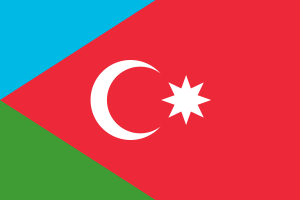Difference between revisions of "Language/South-azerbaijani/Culture/Traditions-and-Festivals"
m (Quick edit) |
m (Quick edit) |
||
| Line 1: | Line 1: | ||
<span pgnav> | |||
{| class="wikitable pg_template_nav" | |||
|[[Language/South-azerbaijani/Culture/History-and-Geography|◀️ History and Geography — Previous Lesson]] | |||
|[[Language/South-azerbaijani/Culture/Music-and-Dance|Next Lesson — Music and Dance ▶️]] | |||
|} | |||
</span> | |||
{{South-azerbaijani-Page-Top}} | {{South-azerbaijani-Page-Top}} | ||
| Line 75: | Line 82: | ||
{{South-azerbaijani-Page-Bottom}} | {{South-azerbaijani-Page-Bottom}} | ||
<span pgnav> | |||
{| class="wikitable pg_template_nav" | |||
|[[Language/South-azerbaijani/Culture/History-and-Geography|◀️ History and Geography — Previous Lesson]] | |||
|[[Language/South-azerbaijani/Culture/Music-and-Dance|Next Lesson — Music and Dance ▶️]] | |||
|} | |||
</span> | |||
Revision as of 22:41, 2 April 2023
| ◀️ History and Geography — Previous Lesson | Next Lesson — Music and Dance ▶️ |
Introduction
In this lesson, you will learn about the most important traditions and festivals celebrated in South Azerbaijan. South Azerbaijan has a rich and diverse culture shaped by its history and geography. By learning about these traditions and festivals, you will gain a deeper understanding of the people and customs of South Azerbaijan.
Traditional Clothing
Traditional clothing is an essential part of many South Azerbaijani celebrations. Women's clothing is usually colorful and decorated with embroidery and beads, while men's clothing is more understated. Here are some examples of traditional South Azerbaijani clothing:
| South Azerbaijani | Pronunciation | English |
|---|---|---|
| Pələng-Puşa | puh-lung poo-shah | Traditional women's shirt |
| çərənpərəst | chair-en-puh-rest | Traditional men's shirt |
| xalçalar | khul-jah-lar | Traditional women's pants |
| kürta | koor-tah | Traditional men's tunic |
Novruz Bayrami
Novruz Bayrami is the most important festival in South Azerbaijan, and it marks the Persian New Year. The festival is celebrated on the day of the vernal equinox, usually around March 20th or 21st. Novruz Bayrami lasts for 12 days and is a time for family and community gatherings.
During Novruz Bayrami, people set up a special table called "haft seen" with seven items that start with the Persian letter "sin," such as vinegar, sumac, garlic, and apples. This table symbolizes the seven creations and the seven holy immortals in Zoroastrianism. Other traditions include jumping over fires to ward off evil spirits and giving gifts to children.
Gurban Bayrami
Gurban Bayrami, also known as Eid al-Adha, is a Muslim holiday that commemorates the willingness of Ibrahim (Abraham) to sacrifice his son Ishmael as an act of obedience to God. The festival is celebrated on the 10th day of the Islamic month of Dhu al-Hijjah, which is the last month of the Islamic calendar.
During Gurban Bayrami, Muslims sacrifice a sheep or other animal and distribute the meat to family, friends, and the poor. The festival is also a time for prayer, reflection, and charity. Muslims all over the world celebrate Gurban Bayrami, but the traditions and customs may vary depending on the culture and region.
Kəva Pükü Festival
Kəva Pükü (translated as "Old Uncle" in English) is a traditional South Azerbaijani festival celebrated in the city of Tabriz. The festival is named after a legendary old man who used to live in the mountains and help travelers. It is celebrated on the longest night of the year, usually around December 21st.
During Kəva Pükü, people light bonfires, sing songs, dance, and exchange gifts. It is also a time for divination, and people may ask for good luck in the coming year. The festival is a unique celebration of South Azerbaijani culture and is a reflection of the region's rich history and traditions.
Ashura
Ashura is a Muslim holiday that commemorates the martyrdom of Imam Hussein, the grandson of Prophet Muhammad. The festival is celebrated on the 10th day of Muharram, the first month of the Islamic calendar. Ashura is observed by both Shia and Sunni Muslims, although the customs and traditions may vary.
In South Azerbaijan, Ashura is a time for mourning and reflection. Some people participate in processions and reenactments of the Battle of Karbala, where Imam Hussein and his followers were killed. Others may use the occasion to distribute food to the poor or engage in acts of charity.
Conclusion
In this lesson, you learned about some of the most important traditions and festivals celebrated in South Azerbaijan. These cultural celebrations are an essential part of South Azerbaijani life and reflect the rich history and diversity of the region. By gaining a deeper understanding of these traditions, you will be better equipped to communicate and engage with the people of South Azerbaijan.
Other Lessons
Template:South-azerbaijani-Page-Bottom
| ◀️ History and Geography — Previous Lesson | Next Lesson — Music and Dance ▶️ |
